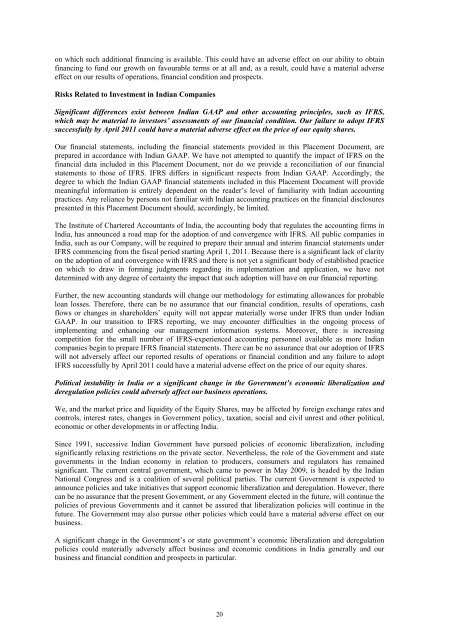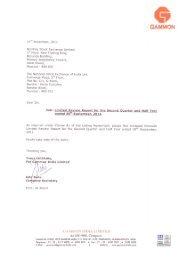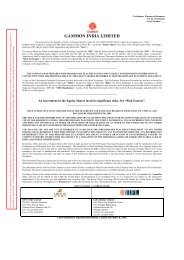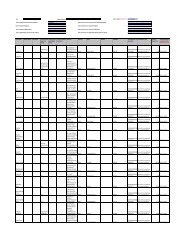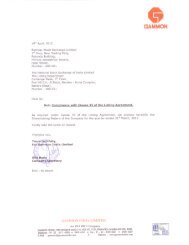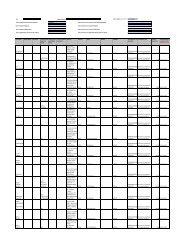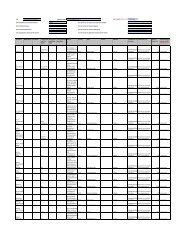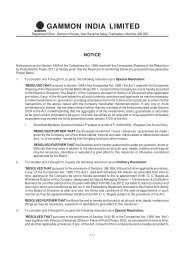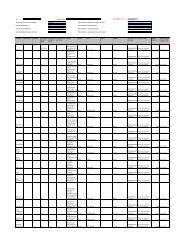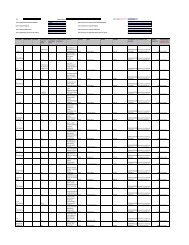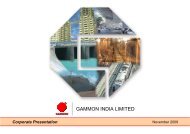GAMMON INDIA LIMITED
GAMMON INDIA LIMITED
GAMMON INDIA LIMITED
Create successful ePaper yourself
Turn your PDF publications into a flip-book with our unique Google optimized e-Paper software.
on which such additional financing is available. This could have an adverse effect on our ability to obtain<br />
financing to fund our growth on favourable terms or at all and, as a result, could have a material adverse<br />
effect on our results of operations, financial condition and prospects.<br />
Risks Related to Investment in Indian Companies<br />
Significant differences exist between Indian GAAP and other accounting principles, such as IFRS,<br />
which may be material to investors’ assessments of our financial condition. Our failure to adopt IFRS<br />
successfully by April 2011 could have a material adverse effect on the price of our equity shares.<br />
Our financial statements, including the financial statements provided in this Placement Document, are<br />
prepared in accordance with Indian GAAP. We have not attempted to quantify the impact of IFRS on the<br />
financial data included in this Placement Document, nor do we provide a reconciliation of our financial<br />
statements to those of IFRS. IFRS differs in significant respects from Indian GAAP. Accordingly, the<br />
degree to which the Indian GAAP financial statements included in this Placement Document will provide<br />
meaningful information is entirely dependent on the reader’s level of familiarity with Indian accounting<br />
practices. Any reliance by persons not familiar with Indian accounting practices on the financial disclosures<br />
presented in this Placement Document should, accordingly, be limited.<br />
The Institute of Chartered Accountants of India, the accounting body that regulates the accounting firms in<br />
India, has announced a road map for the adoption of and convergence with IFRS. All public companies in<br />
India, such as our Company, will be required to prepare their annual and interim financial statements under<br />
IFRS commencing from the fiscal period starting April 1, 2011. Because there is a significant lack of clarity<br />
on the adoption of and convergence with IFRS and there is not yet a significant body of established practice<br />
on which to draw in forming judgments regarding its implementation and application, we have not<br />
determined with any degree of certainty the impact that such adoption will have on our financial reporting.<br />
Further, the new accounting standards will change our methodology for estimating allowances for probable<br />
loan losses. Therefore, there can be no assurance that our financial condition, results of operations, cash<br />
flows or changes in shareholders’ equity will not appear materially worse under IFRS than under Indian<br />
GAAP. In our transition to IFRS reporting, we may encounter difficulties in the ongoing process of<br />
implementing and enhancing our management information systems. Moreover, there is increasing<br />
competition for the small number of IFRS-experienced accounting personnel available as more Indian<br />
companies begin to prepare IFRS financial statements. There can be no assurance that our adoption of IFRS<br />
will not adversely affect our reported results of operations or financial condition and any failure to adopt<br />
IFRS successfully by April 2011 could have a material adverse effect on the price of our equity shares.<br />
Political instability in India or a significant change in the Government’s economic liberalization and<br />
deregulation policies could adversely affect our business operations.<br />
We, and the market price and liquidity of the Equity Shares, may be affected by foreign exchange rates and<br />
controls, interest rates, changes in Government policy, taxation, social and civil unrest and other political,<br />
economic or other developments in or affecting India.<br />
Since 1991, successive Indian Government have pursued policies of economic liberalization, including<br />
significantly relaxing restrictions on the private sector. Nevertheless, the role of the Government and state<br />
governments in the Indian economy in relation to producers, consumers and regulators has remained<br />
significant. The current central government, which came to power in May 2009, is headed by the Indian<br />
National Congress and is a coalition of several political parties. The current Government is expected to<br />
announce policies and take initiatives that support economic liberalization and deregulation. However, there<br />
can be no assurance that the present Government, or any Government elected in the future, will continue the<br />
policies of previous Governments and it cannot be assured that liberalization policies will continue in the<br />
future. The Government may also pursue other policies which could have a material adverse effect on our<br />
business.<br />
A significant change in the Government’s or state government’s economic liberalization and deregulation<br />
policies could materially adversely affect business and economic conditions in India generally and our<br />
business and financial condition and prospects in particular.<br />
20


